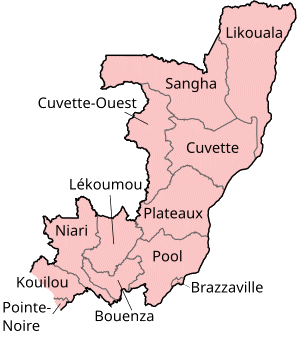Republic of the Congo
Republic of the Congo (also known as Congo-Brazzaville) is a country located in Central Africa. It is bordered by five countries: Gabon to the west, Cameroon and the Central African Republic to the north, the Democratic Republic of the Congo to the east and south, and the Cabinda enclave of Angola to the southwest. The country's capital and largest city is Brazzaville.
History[edit | edit source]
The area of the Republic of the Congo was inhabited as early as the 10th century by the Bantu tribes. The region was later colonized by the European powers, with France establishing control in the late 19th century. The Republic of the Congo gained independence from France on August 15, 1960.
Geography[edit | edit source]
The Republic of the Congo is located in the central-western part of sub-Saharan Africa. It has a diverse landscape with coastal plains, mountainous regions, and a large area of rainforest in the north of the country.
Politics[edit | edit source]
The Republic of the Congo is a unitary state and semi-presidential republic. The President is the head of state, and the Prime Minister is the head of government.
Economy[edit | edit source]
The economy of the Republic of the Congo is a mixture of subsistence farming, an industrial sector based largely on oil and support services, and government spending. Oil has supplanted forestry as the mainstay of the economy.
Culture[edit | edit source]
The culture of the Republic of the Congo has been shaped by the cultures of the indigenous tribes, French colonial influence, and the impact of rapid urbanization in the post-independence period.
Gallery[edit | edit source]
Court of Loango
Pro-constitutional reform demonstration in Brazzaville - 2015
GDP per capita development of the Republic of the Congo
Republic of the Congo Product Exports (2019)
See also[edit | edit source]
- List of cities in the Republic of the Congo
- Transport in the Republic of the Congo
- Education in the Republic of the Congo
Search WikiMD
Ad.Tired of being Overweight? Try W8MD's NYC physician weight loss.
Semaglutide (Ozempic / Wegovy and Tirzepatide (Mounjaro / Zepbound) available. Call 718 946 5500.
Advertise on WikiMD
|
WikiMD's Wellness Encyclopedia |
| Let Food Be Thy Medicine Medicine Thy Food - Hippocrates |
Translate this page: - East Asian
中文,
日本,
한국어,
South Asian
हिन्दी,
தமிழ்,
తెలుగు,
Urdu,
ಕನ್ನಡ,
Southeast Asian
Indonesian,
Vietnamese,
Thai,
မြန်မာဘာသာ,
বাংলা
European
español,
Deutsch,
français,
Greek,
português do Brasil,
polski,
română,
русский,
Nederlands,
norsk,
svenska,
suomi,
Italian
Middle Eastern & African
عربى,
Turkish,
Persian,
Hebrew,
Afrikaans,
isiZulu,
Kiswahili,
Other
Bulgarian,
Hungarian,
Czech,
Swedish,
മലയാളം,
मराठी,
ਪੰਜਾਬੀ,
ગુજરાતી,
Portuguese,
Ukrainian
Medical Disclaimer: WikiMD is not a substitute for professional medical advice. The information on WikiMD is provided as an information resource only, may be incorrect, outdated or misleading, and is not to be used or relied on for any diagnostic or treatment purposes. Please consult your health care provider before making any healthcare decisions or for guidance about a specific medical condition. WikiMD expressly disclaims responsibility, and shall have no liability, for any damages, loss, injury, or liability whatsoever suffered as a result of your reliance on the information contained in this site. By visiting this site you agree to the foregoing terms and conditions, which may from time to time be changed or supplemented by WikiMD. If you do not agree to the foregoing terms and conditions, you should not enter or use this site. See full disclaimer.
Credits:Most images are courtesy of Wikimedia commons, and templates, categories Wikipedia, licensed under CC BY SA or similar.
Contributors: Prab R. Tumpati, MD






